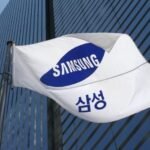The logos of the mobile messenger app Line and Yahoo! Japan are seen in this November 2019 file photo (Courtesy of AP, Yonhap)
Recent actions by the Japanese government and chief executives of LY Corp. and SoftBank Corp. are raising eyebrows, leading many to question whether Japan is truly a market economy.
As the government gets involved to demand South Korea’s Naver Corp. sell down its control in LY Corp., jointly run by Naver and Softbank, the situation starts to resemble state interference rather than a market-based approach.
Some industry officials even raised suspicions that the move may have been pre-planned for Tokyo to seize control of the Korean-Japanese JV.
At the center of the red-hot issue of late between the two neighboring countries is LY Corp., which came into being in 2021 through a merger of Naver’s Line, the most popular mobile messenger app in Japan, and SoftBank’s Yahoo Japan.
Naver and SoftBank each hold a 50% stake in A Holdings, a company controlling 64.5% of LY. If SoftBank acquires just one more share in A Holdings, it would control LY, or Line-Yahoo.
Since its inception, LY has seen remarkable growth, with revenue increasing from 1.57 trillion yen ($10.1 billion) in 2021 to 1.81 trillion yen last year. It has expanded its reach beyond messaging and portal services into administrative and other areas.
TURNING POINT: DATA LEAK
The turning point came last November when Naver Cloud Corp., a unit of the Korean tech giant, suffered a cyberattack, resulting in the breach of Line users’ personal data.
The Japanese government responded not just with a call for tighter cybersecurity but also with administrative guidance suggesting a complete severance of ties between Naver and LY’s IT infrastructure.
The situation escalated to the point where Japan’s Ministry of Internal Affairs and Communications was pushing for Naver to sell its stake in A Holdings.
This culminated in LY CEO Takeshi Idezawa’s firm request on Wednesday that Naver divest its shares, citing the ministry’s guidance. On the same day, LY’s board of directors announced that Jungho Shin, LY’s chief product officer and its only Korean board member, would step down from the board.
On Thursday, SoftBank CEO Junichi Miyakawa said it is in talks with Naver over the fate of their joint management of LY, and that the two parties are working to reach an agreement by July.
The Naver Data Center in Korea
NOT THE CASE OF THE US CRACKDOWN ON CHINA’S TIKTOK
To put things into perspective, this situation is distinct from the US government’s crackdown on the Chinese-owned TikTok, where national security concerns provided a clear basis for legislative action.
Japan’s approach, however, lacks a defined legal framework, relying instead on ambiguous administrative guidance.
Moreover, what Line-Yahoo has achieved so far is the result of significant investment and effort from Naver, which successfully established the company in a competitive market.
For the Japanese government to now demand Naver’s exit, after all the hard work and investment, seems at odds with the principles of a civilized nation.
Naver’s headquarters building
These developments warrant concern and call for a return to rationality. If the Japanese government continues to disregard market principles and exert undue influence over business decisions, it risks undermining its own reputation as a country with a robust, free-market economy.
It’s essential that Japan’s policymakers reconsider their approach to ensure that businesses operate within a framework that values autonomy and respects international partnerships. The world will be watching to see how this situation unfolds.
The Korea Economic Daily Editorial
In-Soo Nam edited this article.














